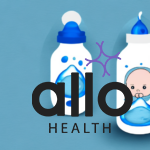Disodium Hydrogen Citrate Syrup Uses in Pregnancy

Allo Health is dedicated to personalized well-being, offering support and trusted information tailored to individual health goals. The platform emphasizes human-generated content, led by a distinguished medical team of experts, including physicians and sexual health specialists. Their commitment to credibility involves rigorous fact-checking, authoritative research, and continuous updates to ensure accurate, up-to-date information. Allo Health's unique approach goes beyond conventional platforms, providing expert-led insights and a continuous commitment to excellence, with user feedback playing a crucial role in shaping the platform's authoritative voice.

Dr Sanina Mansoor holds MBBS degree from Yenepoya university,Mangalore.She has 8 years of experience working as a medical officer at various health centres and medical colleges.
Why This Was Upated?
Our experts continually monitor the health and wellness space, and we update our articles when new information became available.
Updated on 01 January, 2024
- Article was updated as part of our commitment to diversity, equity, and inclusion.

"The following blog article provides information about a drug or brand name drug and its potential effects or benefits. However, it is crucial to understand that this information is intended for general educational purposes only and should not be considered a substitute for professional medical consultation. It is highly recommended to consult with a qualified healthcare professional before making any decisions regarding medication, treatment, or healthcare management.
Book consultation
Individuals have unique medical conditions, and the information provided in this article may not be applicable to everyone. Only a qualified healthcare provider can evaluate your specific medical situation, taking into account your medical history, conducting appropriate tests, and providing personalized advice and recommendations. They are equipped to make informed decisions tailored to your individual needs.
It is crucial to emphasize that self-diagnosis, self-medication, or disregarding medical advice can have serious health consequences. This article may reference specific brand names or drugs for illustrative purposes. Mention of these names does not imply endorsement, recommendation, or guarantee of their efficacy or safety. The choice of medication should be based on discussions and individualized guidance from a healthcare professional who has a comprehensive understanding of your medical condition.
"The phase of pregnancy bring excitement, anticipation, and joy for many women. Like any significant moment, this also give few hiccups. These hiccups, even though minor, screams for attention and care. One such common concern that expecting mothers might face is urinary tract infections (UTIs). These infections can be quite uncomfortable and distressing. To our fortune, there are many solutions to this problem available that helps to manage and overcome these concerns. Among these solutions is the most recommended one is disodium hydrogen citrate syrup. This medicine during pregnancy is not just any syrup; it can be a source of comfort and relief for many pregnant women. Let’s try to understand the role and disodium hydrogen citrate syrup uses in pregnancy, during this crucial phase of a woman’s life.
What Kind of Medicine is Disodium Hydrogen Citrate Syrup?
It’s a specially designed solution, much like the syrups you usually take, but with a specific purpose. This is known as a defender for many urinary tract concerns.
Fighting Against UTIs
- UTIs or Urinary Tract Infections can be quite irritable and bothersome in the life of a pregnant women.
- Some of the symptoms are burning sensation and itching while urinating, a frequent urge to go to the bathroom and stomach pain.
- This syrup gives sudden relief and comfort by warding off the infections.
Balancing Acidity in Urine
- Just like any liquid like blood, water, lemon juice or soap water, urine also has it’s balance.
- Time to time this balance gets disturbed and leans towards more acidic, which can be quite bothersome.
- Then disodium hydrogen citrate syrup steps in to maintain this balance, preventing urine becoming acidic and creating a more clean and comfortable environment inside our urinary system.
Why is This Medication Required During Pregnancy?
Pregnancy is a most auspicious time in any woman’s life, and ensuring proper and balanced health condition is crucial. One of the way to achieve this is by incorporating disodium hydrogen citrate syrup with the other supplements and medications. Now, we break down why this syrup is required during pregnancy:
Combats Urinary Tract Infections

- Common Concern: UTIs frequently occur during pregnancy due to changes in the hormones level, in return reducing the body’s immunity system and can cause potential risk to both mother and the baby.
- Role of the Syrup: Disodium hydrogen citrate syrup acts like an urine alkalizer agent. It can help in making the urine more alkaline, which in return create a unfavorable environment for the bacteria to thrive.
- Benefit: By reducing the acidity of urine, it fix the burning sensation and itching due to UTIs.
Prevents Stone Formation

- The Problem: Pregnancy can cause to increase in the excretion of calcium in urine, which then contribute to the formation of calcium- rich types of kidney stones causing kidney disease.
- How the Syrup Helps: The syrup aids in preventing the accumulation of minerals that could form stones and eliminating the excess uric acid salts by making it less acidic urine. This result in prevention and treatment of certain type of kidney stones, especially uric acid stones.
- Peace of Mind: With a reduced risk of kidney stones, mothers-to-be can have one less health concern to worry about.
Maintains Healthy Urine pH
- Importance of pH Balance: Urine pH represents how acidic or basic the urine is. The neutral pH is around 7, where urine pH falls between 4.5 and 8. A balanced urine pH prevents the growth of many harmful bacteria, in return reducing the risk of UTIs.
- Syrup’s Role: Disodium hydrogen citrate syrup is an alkalizing agent which helps in maintaining the pH of urine and making it less acidic.
- Positive Outcomes: Keeping the urine’s pH in check, this syrup can offer relief from the painful and discomforting UTI symptoms.
Is It Safe to Take this Syrup During Pregnancy?
Pregnancy is a critical time both for mother and the baby, and it’s vital to know what’s safe for you and your baby. So let’s try to understand the safety of disodium hydrogen citrate syrup during this time:
- Safety in Pregnancy: Always try to weigh the benefits against the risks while considering any medications during pregnancy.
- Never ever self-prescribe. It’s essential to get guidance from your healthcare professional before incorporating any medicine to your routine.
- Current Understanding: All medication carries some risk factors, but in this case the benefits of taking this medication during pregnancy is a little higher than the potential risk. Just because we don’t have evidence showing harm doesn’t mean it’s guaranteed safe. Always consult a healthcare professional and follow the recommended dosage.
- Consider Alternatives: If the idea of taking this syrup worries you, speak your concerns to your doctor. Your healthcare provider can suggest alternative treatments or remedies that might be more suitable for you.
Notes: Every individual’s body responds in different ways to medications. Something safe for one person may not be for another.
Common Side Effects of Disodium Hydrogen Citrate Syrup Uses in Pregnancy
- Gastrointestinal Disturbances: Some women may experience stomach upset, diarrhea, nausea or heartburn during pregnancy after incorporating the syrup into the routine.
- Electrolyte Imbalance: Excess use of this medication can affect the balance of electrolytes in the body, which can cause medical conditions like hyperkalemia (increased potassium levels) or hypocalcemia (decreased calcium levels) causing blood pressure concerns.
- Altered Blood pH: Disodium hydrogen citrate makes the blood more alkaline. This shift in blood pH might not be suitable for everyone, especially during pregnancy.
- Allergic Reactions: Though rare, some people observe allergic reactions to the syrup, including skin rashes or itching.
Precautions
- Doctor’s Advice is Crucial: Always consult with your healthcare provider before taking any medication during pregnancy. They can assess the risks and benefits tailored to your specific situation.
- Potential Drug Interactions: Disodium hydrogen citrate may interact with other medications that affect kidney function or urine pH. Always inform your doctor about all medications, supplements, and over-the-counter drugs you are taking.
- Duration: Use the syrup only for the duration prescribed by your doctor. Prolonged use without medical advice can lead to potential complications.
- Stay Hydrated: Drinking sufficient water can help reduce the risk of kidney stones and ensure that the urinary system functions properly.
- Monitor for Side Effects: If you notice any unusual symptoms after taking the syrup, contact your healthcare provider immediately.
Some Tips for Mother-to-be
Starting the new journey of motherhood? This exciting time can also bring many questions and concerns for the better upbringing of the child. Here are some of the suggestions to guide you through your pregnancy journey with ease and comfort-
Stay Hydrated
Water consist of 70% of our body and essential for the functioning of all systems of our body, especially during pregnancy. It not only keeps you refreshed but also take care of your baby and the pregnancy related concerns.
Benefits:
- Help in maintaining the amniotic fluid levels.
- Assists in transporting essential nutrients to the baby.
- Prevent UTIs by flushing out bacteria from the urinary tract and managing the symptoms.
Suggestion: Aim for 8-10 glasses of water daily. Consider carrying a reusable water bottle to remind yourself to drink throughout the day.
Regular Check-ups
Regular visits to your healthcare provider ensure that both you and your baby are in optimal health.
Benefits:
- Early detection of potential complications.
- Monitoring the baby’s growth and development.
- Receiving essential prenatal vitamins and advice tailored to your pregnancy.
Suggestion: Mark your calendar with appointment dates. Having a partner or friend accompany you can provide emotional support and an extra set of ears for any advice given.
Ask Questions
Pregnancy is a new experience for many. It’s natural to have questions and concerns.
Benefits:
- Gain clarity on any doubts.
- Make informed decisions for your health and the baby’s well-being.
- Reduce anxiety and fear related to the unknown.
Suggestion: Keep a small notebook handy. Whenever a question pops up, jot it down. Bring this notebook to your appointments to ensure you don’t forget to ask.
Conclusion
Disodium hydrogen citrate syrup can be a great companion for expecting mothers to tackle UTIs. However, always remember, your doctor’s advice is golden. It’s essential to take medications only under professional guidance for a safe and healthy pregnancy journey.
Frequently Asked Questions (FAQ)
(1) What is Disodium Hydrogen Citrate Syrup?
It’s a liquid medicine that helps make urine less acidic. By doing this, it aids in preventing and treating problems related to the urinary tract.
(2) Can I use Disodium Hydrogen Citrate Syrup during pregnancy?
Yes, it’s often prescribed for pregnant women dealing with urinary tract infections. However, it’s vital to consult with your doctor before starting any medication during pregnancy.
(3) Are there any side effects of using this syrup?
Like all medicines, disodium hydrogen citrate syrup might have side effects. If you notice anything unusual or feel uneasy after consumption, it’s best to reach out to your doctor for guidance.
(4) How often should I take Disodium Hydrogen Citrate Syrup?
The frequency and dosage depend on individual needs and the doctor’s prescription. It’s crucial to stick to the recommended dosage for the best results and safety.






































